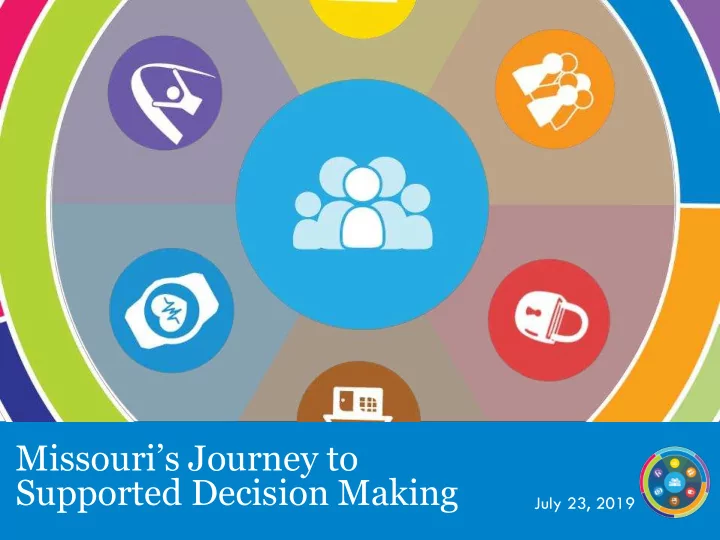

Missouri’s Journey to Supported Decision Making July 23, 2019
About Jane …. • Mom of 3 sons, “Ben’s mom” • Partners in Policymaking Graduate (Missouri 1999) • UMKC-Institute for Human Development, UCEDD • National Community of Practice on Supporting Families Staff • Co-developer of the CtLC framework and tools • Trainer/Coordinator of activities focusing on supported decision making
Missouri Guardianship: Understanding Your Options & Alternatives 2009 and 2013 Partnership between: ➢ UMKC-IHD, UCEDD ➢ Missouri Protection and Advocacy ➢ Missouri Developmental Disabilities Council ➢ People First of Missouri
Mo Guardianship: Understanding Options and Alternatives Developed and launched in 2009/2013 Workshops for families, self-advocates, and professionals Promoted making informed decisions about guardianship options and alternatives with emphasis on supported decision making
MO-WINGS
Summary of Statute Revisions to Guardianship Code
Summary of Statute Revisions to Guardianship Code Appointment Priority (Court to appoint suitable relative over unrelated 3 rd party) Co-Guardians Petition for appointment of guardian for adult must now state factual basis for petitioner’s conclusion of incapacity, including incidents and specific behaviors of respondent that support why sought Clear and convincing evidence of incapacity, and evidence that needs cannot be met by a less restrictive alternative Respondents rights at hearings
Summary of Statute Revisions to Guardianship Code Court must now consider if respondent’s needs can be met by a less restrictive alternative before appointing a guardian ( specifically states SUPPORTED DECISION MAKING AGREEMENTS ) Required specific findings (including retention of rights to vote, drive or marry; placement or management of other essential needs) NEW Specific guardian powers and requirements May only exercise authority as required by ward’s limitation MUST encourage ward to participate in decisions to extent possible, and develop or regain capacity
So, What’s NEXT?
Missouri’s Vision & Trajectory for Supported Decision Making
Supported Decision Making Symposium September 12, 2018
3 Guiding 1. Recognize and respect that everyone has an equal right to make Principles their own decisions, regardless of their diagnosis or functional challenges. 2. Be respectful of the various Agreed upon at the opinions and deeply held beliefs that Symposium have led parents and advocates to choose different options for decision- making support, including SDM. 3. Promote the use and development of practices that will provide people in need of support with individualized decision-making assistance in a way that imposes the absolute minimum restriction of rights.
Findings & Recommendations Customized education and training programs on SDM theory, practice, and benefits SDM materials Changes in guardianship numbers
Review and expand existing projects and resources advancing SDM Next Steps Develop new projects and resources that will advance SDM Identify, acknowledge, and overcome challenges and obstacles to implementing SDM in Missouri
Launch of Missouri Consortium on SDM March 31st, 2019
The Consortium: Identified and prioritized strategies and tools to inform Missourians about SDM Broke into work groups to continue progress between meetings Will reconvene in five to six months to share what has been done and plan next steps
Pilot: Health Care & SDM
Charting the LifeCourse Health Care Preferences and Supported Decision Making for People with IDD • Enhance the partnership between medical professionals, adults with IDD, family members, and disability providers that supports informed choice and SDM practices on health care decisions • Increase knowledge and skills by providing training and coaching on SDM • Facilitate effective communication with each target group in the St. Joseph, Missouri area • Develop and disseminate Charting the LifeCourse Healthcare Training and Coaching Toolkit Established in 2002, WITH Foundation (formerly known as Special Hope Foundation) is a private foundation. The Foundation’s in itial grantmaking benefited the disability community. In 2011, the Foundation began to focus its support on organizations and projects that promote the establishment of comprehensive and accessible health care for adults with intellectual and developmental disabilities. Currently, the Foundation gives out around $750,000 each year and has provided (in total) more than $7 million in funding support.
Project Objectives Self-Advocates demonstrate increased skills and confidence for making decisions in healthcare settings . Family members and disability staff demonstrate increased skills and knowledge of the Supported Decision Making ( SDM) process Medical Professionals demonstrate increased knowledge of IDD as well as increased skills and confidence to partner in the SDM process that leads to informed consent Develop a Charting the LifeCourse HealthCare Preferences, Supported Decision Making Training and Coaching Toolkit
Supported Decision Making Tools and Resources
Exploring Supported Decision Making
Tool for Understanding the Decision Making Support Needs and Team
Today’s Health Care Visit How do you prepare? How do you remember what happened at the visit? How do others know what happened at the visit? How do you follow up?
Ben’s Tool for Exploring Decision Making Supports
Ben’s SDM Supports
Ben’s Support Team
Questions?
THANK YOU!!! Jane St John stjohnj@umkc.edu
Recommend
More recommend